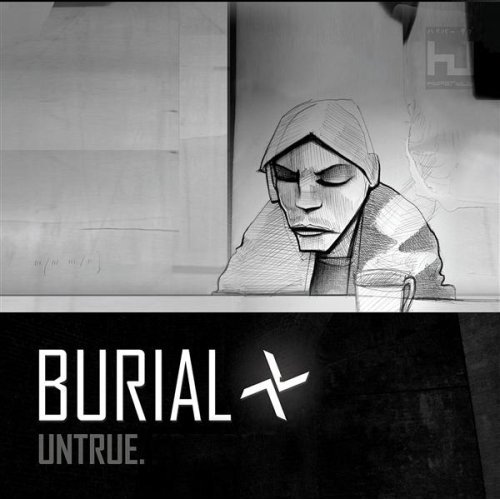
60.
Burial
“Archangel”
[Hyperdub; 2007]
I’ll admit I’m no expert regarding the genre of dubstep. But that doesn’t mean I can’t and don’t enjoy it and am not able to be transfixed by Burial’s work. “Archangel” is a striking track that finds its beauty in aged fuzzy samples, trickling beats and ghostly canned strings. Beven manipulates the sample to the near point of helium overload, but it never sounds cheesy or stupid; rather, it’s a brilliant exercise of a fine musical technique. He stretches the words of the singer to make the melody happen, right down to it creating a sense of synesthesia, sounding like you can see him doing it in real time on his computer or on a pair of DJ decks. Much like Hitchcock showed with his masterpiece Vertigo, we as society are always trying to manipulate others, whether they are people we know or celebrities, into looking a certain way and being the perfect figure. It’s exactly the same principle with the Pop Idol shows, in that stars are made to an exact image, put on a spot and told to sing in a certain manner. The majority of the population eats it right up, falling for its hollow and seemingly perfect charm. I doubt anyone in that audience would care for “Archangel” and would probably call the disfigured voice in the song ugly. If that’s the case then “Archangel” is pretty ugly.
– Ray Finlayson
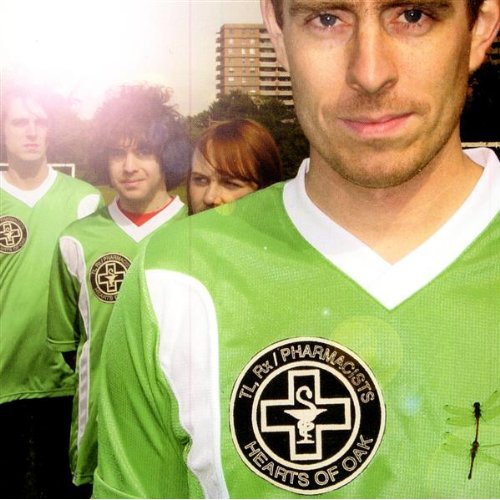
59.
Ted Leo and The Pharmacists
“Where Have All the Rude Boys Gone?”
[Lookout!; 2003]
When Ted Leo sings, he always sounds as if he’s on the verge of a tearful nervous breakdown, contradicting his brand of fast, upbeat punk/power-pop. This is a recurring theme in Leo’s music, and it gets displayed to full effect in “Where Have All the Rude Boys Gone?,” a song that charges in with a galloping guitar and the pseudo-suicidal opening line, “It’s times like these when a neck looks for a knife // a wrist for a razor // a heart is longing for bullets.” The song, clocking in at over five minutes long, calms itself down near the end, asking the same (possibly rhetorical) question in the song’s title.
– Arika Dean
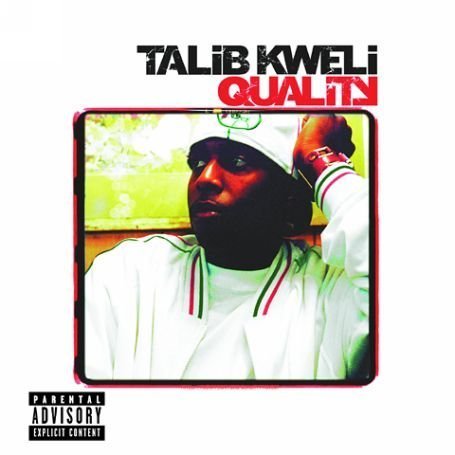
58.
Talib Kweli
“Get By”
[Rawkus / UMVD; 2002]
Talib Kweli is one of the most commercially overlooked rappers of modern times. He has made some of the finest hip hop albums of recent years collaborating with Mos Def on Black Star, with Hi-Tek on the Reflection Eternal project. On his amazing solo debut, Quality, he expands his MC credentials with standout tracks such as “Get By.” Produced by Kanye West, Kweli illustrates a portrait of an uphill struggle for personal success. Some people work to the bone, just to survive.
– Mike Mulvenna
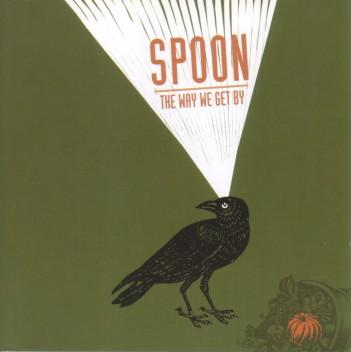
57.
Spoon
“The Way We Get By”
[Merge; 2002]
Spoon are usually at their best when they’re working with as little as possible; here, on “The Way We Get By,” we get what’s quite easily their most swaggering, anthemic tune with no more than bass, drums, and piano – some handclaps near the end, too. Of course, it takes Britt Daniel’s complete inhabitation of the song for it to work as well as it does, and his performance here is as as coolly assured as it is arresting. Kill the Moonlight was the sound of the band with its barest essentials, and it’s hard to argue that they’ve before or since made a more complete statement. It’s a hard record to pick favorites from, but “The Way We Get By” is the strongest candidate.
– Bill Delaney
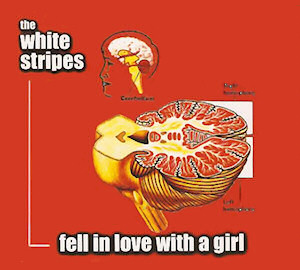
56.
The White Stripes
“Fell In Love With A Girl”
[Sympathy for the Record Industry; 2001]
Jack White is a talented bastard. What requires some bands four, five or even six people to do, Jack can do with only an ex-wife and old equipment from his parents’ attic or a garage sale he visited in the ’90s. That’s impressive on many levels. Furthermore, what some bands need four, five or six minutes to do, Jack does in a lightning quick one minute and 40-some odd seconds. That’s efficiency! Yet another credo of the White Stripes. “Fell In Love With A Girl” is simple to understand. It’s a great riff, a great vocal, and frankly sounds like one giant chorus. There’s no rise or fall; it’s running in the red the whole time. Put it on at any party and it will kill, and it never overstays its welcome. It captures a phase of the White Stripes that sadly might be over; the period where they were critical darlings, but before they started acting like critical darlings. When listening to “Fell In Love With A Girl,” one can actually understand why every single magazine was predicting that the garage rock revival would dominate the whole decade.
– Jason Hirschhorn
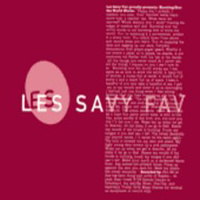
55.
Les Savy Fav
“The Sweat Descends”
[Frenchkiss; 2004]
“The Sweat Descends” starts slowly, only building up on reverb, which gives you the image of sweat slowly dropping from someone’s skin on a hot day. Perhaps that’s just the song title putting imagery in my head, but I’d like to think Les Savy Fav did it intentionally. The song chugs along, sounding like it should be featured on a sports-oriented video game (and it actually was), but just when you thought it might be dumb bro-dude indie rock, frontman Tim Harrington screams intelligent lines like, “This soul is twisted but the skin will mend // My tight young skin covers up the sick palimpsest.”
– Arika Dean
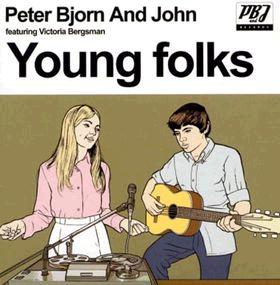
54.
Peter Bjorn and John
“Young Folks”
[Wichita; 2006]
Let’s face it, everyone has gotten the whistle tune from this track stuck in their head before. The song will either make you want to stab your ears, or make you whistle along as you tap your foot. Either way, there is no denying that this song is the definitive ear worm. Once it gets in your head, it will keep digging until it is deep into your consciousness. The Swedish trio laid down the laziest vocals on this track, and it really matches up with the laid back vibe of the track. A guest vocals spot from Victoria Bergsman adds to the cool of this song. All in all this seems to be the kind of song you either love or hate. Oh, and the chorus isn’t bad either.
– Brent Koepp
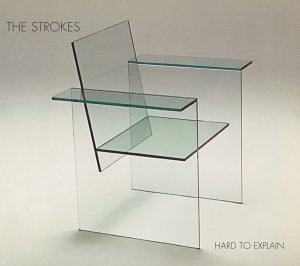
53.
The Strokes
“Hard to Explain”
[RCA; 2001]
Some say the Strokes saved rock and roll in the early part of this decade, and to be honest those people are probably right. Is This It is made up of 11 perfectly crafted songs that completely encapsulate the sheer awesomeness of some nice, good, straightforward, no-bullshit rock and roll. “Hard to Explain,” being a highlight on an album full of highlights, starts out with a simple drum loop that is soon covered up by guitars that sounded like they were recorded in some rich kid’s basement (and guess what, they probably were). Then Julian Casablancas decides to show up, not a second too early, crowning, “Was an honest man,” and something else like, “I don’t see it that way.” Mr. Casablancas continues throughout this song singing what almost sounds like broken fragments from different drunken conversations one has on a Saturday night, ending with the telling line, “it’s hard to explain.” There is no cryptic message or hard truth to be found here; it’s just a perfectly rockin’ song that in the end says, “It’s hard to explain,” and you know what, it’s kind of hard to explain why it took so long for someone to make music like this again.
– Austin Nauert

52.
OutKast
“B.O.B.”
[LaFace / Arista; 2000]
“B.O.B.” might feature a choir singing the line, “Bombs over Baghdad,” but Andre 3000 did not bring in the decade with a socially-conscious war protest song. Instead, he opted for usual scatterbrained lyrics with themes ranging from Atlanta culture to shameless self-promotion. It’s fine, I don’t blame Andre – “B.O.B.” is still a killer cut, clocking in at a ridiculous 155 beats per minute. The lyrical flow is just as fast, which never fails to impress. The guitar solo toward the end amps up the cheese factor a bit, but the choir makes up for it by chanting, “Power music, electric revival!”
– Arika Dean

51.
The Hold Steady
“How A Resurrection Really Feels”
[Frenchkiss; 2005]
“How A Resurrection Really Feels” might be the Hold Steady’s most theatrical song – and that’s saying something. But there’s something undeniably operatic about the song; it was clearly constructed to be the big finale for the group’s breakthrough record, Separation Sunday, a record that, like all Hold Steady records, is a pseudo-concept record about kids, Catholicism and crack (ok, not crack, per se, but drugs in general – I just couldn’t resist the alliteration). The song is one of the group’s very best, but it reaches the stratosphere with the coda, in which a swirling crescendo of piano, guitar, background vocals and furious drumming ebbs and flows before slowly fading away, leaving only a mournful plink-plink melody standing. It’s Big and Profound in that Springsteen way – that way where the B-movie material suddenly feels more like Meaning of Life itself. Like a resurrection, in fact.
– Elias Isquith

